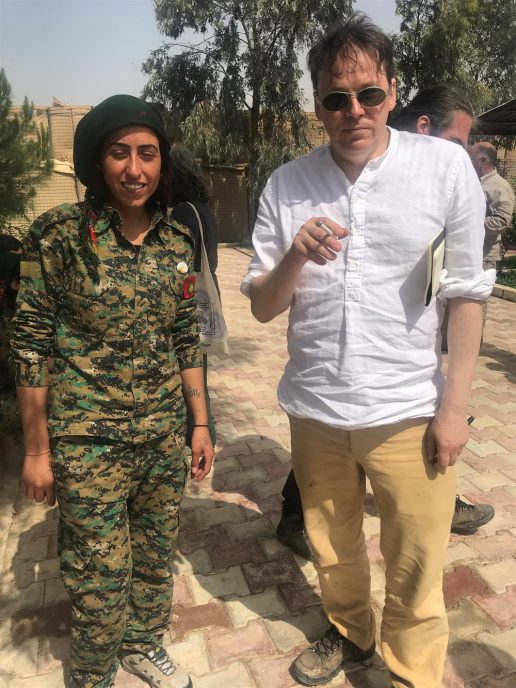David wrote about himself:
I was born and raised in New York, the child of Kenneth Graeber, a plate stripper (offset photolithography), originally from Kansas, who had fought with the International Brigades in the Spanish Civil War, and Ruth (Rubinstein) Graeber, born in Poland, a garment worker and home-maker who had been the female lead in the 1930s Labor Stage musical, Pins & Needles.
Brought up in the Penn South Coops in Chelsea, I attended local public schools, PS 11, and IS 70, was discovered by some Maya archaeologists because of an odd hobby I had developed of translating Maya hieroglyphics, received a scholarship to attend a fancy boarding school for three years (Phillips Academy at Andover), before returning to state school, at SUNY Purchase, where I graduated with a BA in Anthropology in 1984.
From there I went on to University of Chicago. I lived in Chicago for over a decade, apart from two years (between 1989 and 1991) during which I was doing anthropological fieldwork in highland Madagascar, received a PhD in 1996, and then held a series of academic jobs. These included some graduate teaching at Chicago, though admittedly not much, a year at Haverford, a year of unemployment including a visiting scholar status and one course at NYU, and a junior faculty position at Yale. In 2004, the Yale department voted not to continue my contract, before I could begin the process of coming up for tenure. This was a very unusual procedure where new rules had to be invented for my case (i.e., no student or outside reviews were allowed.) Yale gave no reason for its decision other than dissatisfaction with my scholarship but some felt it might not have been entirely irrelevant that I was by this time quite active in the Global Justice Movement and other anarchist-inspired projects.
After Yale I found myself unemployable in my own country, but for some mysterious reason, being avidly shopped pretty much everywhere else. I ended up at Goldsmiths, University of London, from 2007-2013, working with inspiring colleagues and wonderful students, and now, as a full professor, at the London School of Economics, where I am surrounded by some of the best and most interesting people one could hope to be around. After living for some years in several countries at once, I’ve finally settled full-time in London.
I told a magazine once that I’ve been an anarchist since I was 16, so I guess that must be true, but I only really became active in any meaningful way after the beginning 2000, when I threw myself into the Alter-Globalization movement and it might be said that all my work since has been exploring the relation between anthropology as an intellectual pursuit, and practical attempts to create a free society, free, at least, of capitalism, patriarchy, and coercive state bureaucracies. As a result I sometimes feel I’ve had to pursue two full-time careers of research and writing, one peer-reviewed, the other not, since in my activist-oriented work I am interested in trying to ask the sort of question those actively engaged in trying to change the world find useful or important, rather than those of funders and those influenced by same. Still, the two strains intertwine and influence one another in endless, and, I hope, creative and mutually reinforcing ways.

The first book I wrote was Lost People, an ethnography of Betafo (Arivonimamo), a community in Madagascar divided between descendants of nobles and slaves, and I still think it’s my best, because it’s really co-written by all the characters (characters in every sense of the term) who inhabit it. It’s an attempt at a truly dialogic ethnography but as a result it’s a bit long so it took forever to publish it – it was effectively written in 1997 but only appeared ten years later (2007).
The first to be published was Toward an Anthropological Theory of Value (2001), in part my homage to one of my most inspiring teachers at Chicago, Terry Turner. Later, when another inspiring former mentor, Marshall Sahlins, put out a pamphlet series and asked me to contribute a volume, I wrote a tiny little book called “Fragments of an Anarchist Anthropology,” which has doomed me ever since to be referred to as “the anarchist anthropologist” (despite the fact that the book largely argues that anarchist anthropology doesn’t and probably couldn’t really exist. Please don’t do that. You don’t call people “the social democrat anthropologist” do you?) I also wrote a vast ethnography of Direct Action (called “Direct Action: an Ethnography”) which hardly anyone ever reads, a collection of largely academic essays called “Possibilities,” an edited volume called “Constituent Imagination” with Stevphen Shukaitis, a book of political essays called “Revolutions in Reverse”, and a book on debt called “Debt: the First 5000 Years” which virtually everyone seems to have read. This was followed by the Democracy Project (which I actually wanted to call “As If We Were Already Free”), the “Utopia of Rules” (which I wanted to call “Three Essays on Bureaucracy”), “On Kings” (a collection co-written with Marshall Sahlins), and “Bullshit Jobs: A Theory”. I am currently working with the archaeologist David Wengrow on a whole series of works completely re-imagining the whole question of “the origins of social inequality,” starting with the way the question is framed to begin with. After that, who knows?
I’ve continued to be actively engaged in social movements of one sort or another, insofar as I actually can, living in exile with a full-time job. I was involved in the initial meetings that helped set up Occupy Wall Street, for instance, and have been working with the Kurdish Freedom Movement in various capacities as well.
Oh, and since this is a matter of some historical contention: no, I didn’t personally come up with the slogan “We are the 99%.” I did first suggest that we call ourselves the 99%. Then two Spanish indignados and a Greek anarchist added the “we” and later a food-not-bombs veteran put the “are” between them. And they say you can’t create something worthwhile by committee! I’d include their names but considering the way Police Intelligence has been coming after early OWS organisers, maybe it would be better not to.

